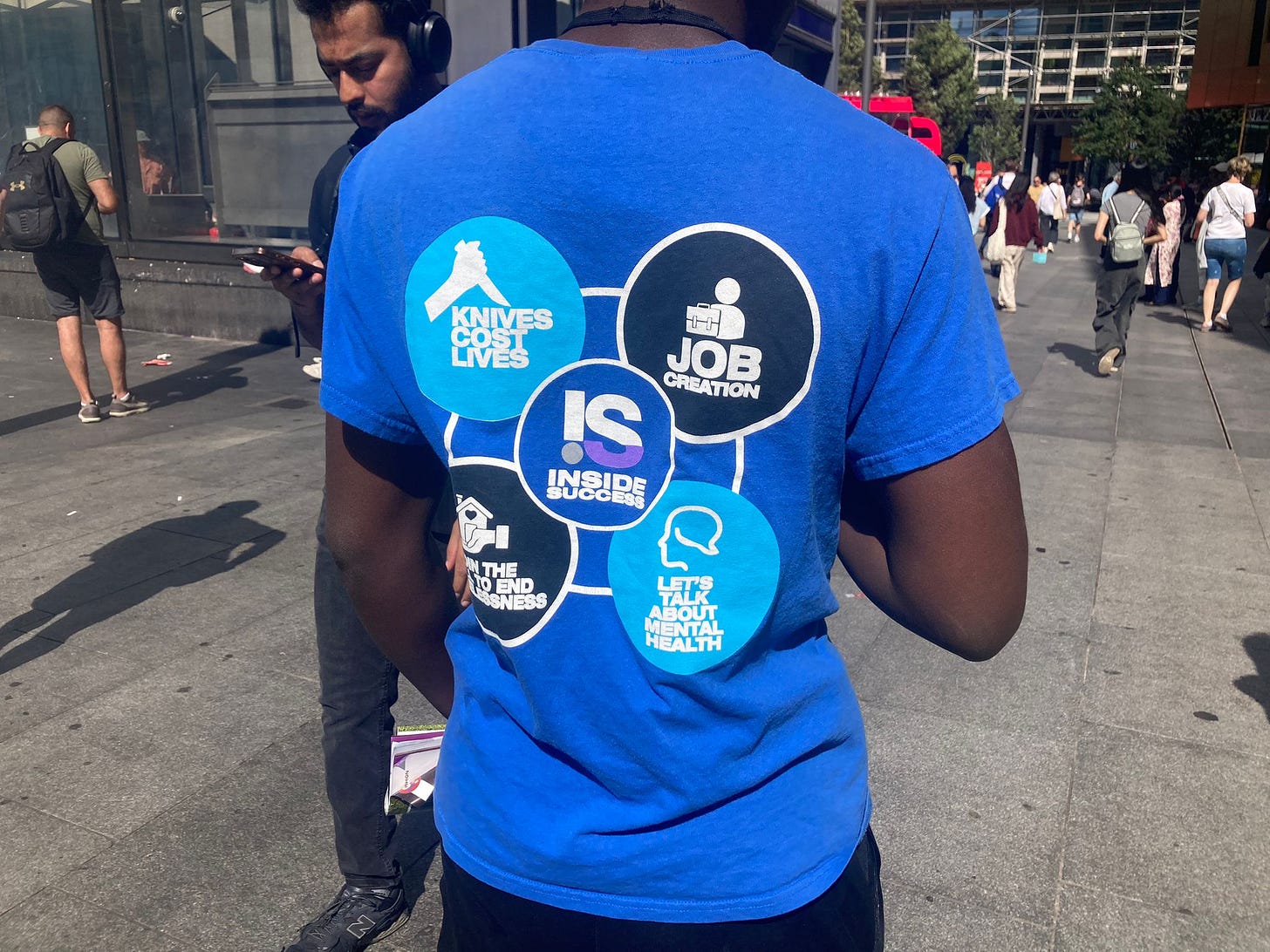Why can't anyone stop the fundraisers outside London stations?
Plus: Stratford Westfield chair chucker pleads guilty and the capital's first baby alpaca of the year.
If you walk out of a central London station there’s a good chance that you’ll be approached by a group of fundraisers with names such as ‘Inside Success’, aimed at supporting young people, or ‘WeRBlighty’, which purports to help military veterans.
All of them hope to benefit from Britons’ world-leading willingness to donate to charity. But none of these groups are actually charities and many of them have broken the law with their fundraising activities. So why are they still allowed to occupy some of the most prominent locations in the capital, when legitimate charities cannot?
As with so many stories in the capital, London Centric has found the problem is a series of legal loopholes, combined with a lack of will and resources to enforce existing rules.
Scroll down to read our investigation into how “fundraisers” took over London’s streets.
London news in brief:
The next London mayoral election will see 16-year-olds vote for the first time, after the central government unveiled plans to lower the voting age for almost all UK elections from 18. London teenagers sitting their GCSEs might not be able to legally hire a Lime bike — but in the future they will get a say in who runs the capital.
London Centric was in court on Wednesday as a 15-year-old boy admitted throwing a heavy chair over a balcony at Westfield Stratford shopping centre, in an incident that was filmed and went viral. When arrested, the boy, who cannot be named for legal reasons, told officers: “It's not that deep, I did not hit no one.”
Prosecutor Elizabeth Ajayi told the court it was pure luck that no one was injured when the chair was dropped 50ft down multiple floors and the boy said in a police interview he "regularly indulged in pranks, including throwing objects off bridges at trains”. The other boy charged following the incident, who is also 15, pleaded not guilty to the same charges and will face trial on 2 October.There was a contentious meeting at Tower Hamlets council last night, as the battle over the future of Mudchute Park and Farm next to Canary Wharf continued. As we previously reported, for fifty years the farm has allowed children (and adults) to bond with sheep, llamas and horses for free in the heart of the London — while the charity that runs it pays a token rent for the land to Tower Hamlets council.
The Aspire-run local authority now seems reluctant to grant the farm a new lease. Last night the public were told that mayor Lutfur Rahman will meet the farm bosses to “find a way forward to protect the farm as a resource for the people”. He previously told a council meeting he’s “not one for freebies, or this peppercorn rent business”. If you know more about what’s really going on behind the scenes then get in touch by emailing hello@londoncentric.media or send a WhatsApp.In cheerier farm news, we’ve been contacted by London Alpacas, who asked if we’d like to share a picture of newborn baby Coco with London Centric readers. Coco was born on Tuesday, with no human intervention, to first time mum Marshmallow and an unnamed "industry legend" alpaca father.
London Alpacas said Coco is the capital’s first baby alpaca (or cria) of the year and was walking in just two hours, which is clearly a subject worth celebrating. (Their camelid farm is located just outside the border of Greater London but you can reach it on the outer end of the Central line, so we’ll give them a pass on that.)
London Centric’s journalism is funded by our members. Thank you to everyone who supports us and makes our investigations possible.
London Centric investigates: Why can’t anyone stop the “fundraising” groups standing outside the capital’s stations?
By Rachel Rees and Liv Facey
Outside Tottenham Court Road station on Wednesday afternoon, like most days, stood a group of young street vendors wearing blue t-shirts branded with anti-knife crime and mental health messages. Grabbing the attention of any commuters or tourists in any way they can, they asked for donations to keep young people away from violence.
“We’re trying to stop stabbings, mate,” shouted one young man on a recent visit, while urging a commuter to stop and give money.
Despite appearances, these groups are not actually charities, a legal status that comes with all sorts of regulations. Instead, they are a special type of business called a Community Interest Company which can be run for profit.
As these organisations proliferate across the capital, London Centric has been looking into Inside Success, one of the sector’s pioneers. We found:
The main way this for-profit company purports to stop knife crime is by employing young people. But that employment largely consists of paying the young people to stand outside stations asking for donations.
Inside Success has made “zero contribution to the fight against knife crime”, according to one boss of a London anti-youth violence charity, who accused it of damaging the reputation of other charities in the sector.
Inside Success’ founders say they were inspired to grow the business after reading the self-help book “Think and Grow Rich”, with the company paying millions of pounds a year in salaries.
Teenagers who formerly worked for Inside Success said they were not paid or were paid late for their “degrading” work in which they felt they were encouraged to portray themselves as potential future victims of knife crime.
Fundraisers have expressed “widespread concern” that the groups outside tube stations are breaking the law by pretending to be newspaper vendors — yet many of London’s councils seem unaware it is up to them to enforce the law.
“Zero contribution to the fight against knife crime”
You might not enjoy being stopped by a "chugger” on the street and asked to sign up to a direct debit — but legal fundraisers have to carry ID and you can complain to a regulator if they are too pushy or overstep the mark. When it comes to Inside Success there is no such option.
Eliza Rebeiro, chief executive of Croydon-based charity Lives Not Knives, told London Centric that the problem with Inside Success is that they are “putting a dampener on charities’ names, and charities themselves” and “affecting the way that people see knife crime”.
Inside Success makes “zero contribution, as far as I can see, to the fight against knife crime,” added the head of another leading UK knife-crime charity. They emphasised its total lack of involvement in sector-wide forums or government projects on the topic, such as the recently launched Coalition to Tackle Knife Crime.
The second knife crime charity boss, who asked to remain anonymous, also accused the company of purposefully hiring lots of young, black street vendors to lean into stereotypes about the victims of knife crime.
Inside Success told London Centric that the company “does not claim to be an anti-knife crime charity”, even though photographs on the company’s website show young people wearing blue t-shirts with the words “stop knife crime” and “knives cost lives” on them.
They said: “We are a social enterprise and our primary mission is to support young people… through providing opportunities in jobs, training and education. We also highlight critical youth issues such as homelessness, mental health, and knife crime.”
“If you get the kids off the street and selling magazines, you keep them away from the gangs”
Inside Success might look like a charity and feel like a charity but its status as a community interest company means it can — with some restrictions — make profits and act like a business, provided its activities are “carried on for the benefit of the community”.
What might be less clear if you’re stopped by one of their street vendors on your commute is that the employment of these individuals selling the magazine constitutes a large proportion of the organisation’s work with young people.
“The concept is if you get the kids off the street and selling magazines, you keep them away from the gangs,” said a businessman who used to sponsor Inside Success and run free training sessions for them. The individual asked to remain anonymous to avoid negative publicity around their past association.
Multiple current and former employees told London Centric that young salespeople can choose between a £10 flat hourly rate or a commission-based income for their five-hour shifts standing outside stations, which are organised via large WhatsApp groups.
While the company does run workshops for the young people it employs, these appear to be relatively modest in comparison to the millions of pounds it has taken in sales – in the twelve months to May 2023, it ran an unspecified “more than 52” workshops across the five UK cities in which it operates, while taking £3.5 million in revenue, company filings show.
When approached for comment, Inside Success told London Centric: “Our work includes providing jobs, offering counselling, addressing financial difficulties, and supporting young people facing homelessness. Additionally, we organise events aimed at inspiring and encouraging young people, as well as exposing them to different industries and career paths.”
“Major burdens on councils in order to obtain prosecutions”
If you want to sell goods on the streets of London, you need a street trading licence from the local council. Alternatively, if you want to fundraise for charity, you need a licence from the police.
In the case of Inside Success and the other groups standing outside the capital’s train stations, they argue they don’t need either licence because they’re neither hawking goods nor fundraising.
Instead, they claim they are “news vendors” selling magazines for profit, giving them a specific opt-out from this legislation.
The “news vendor” legal loophole was introduced in 1982 with the intention of enabling salespeople to stand on street corners selling stacks of newspapers, at a time when a hot-off-the-press copy of the Evening Standard was the only way to find out what was going on in the capital.
It is up to local councils to check whether Inside Success really is just a magazine sales business — or, as the Fundraising Regulator has previously concluded following dozens of complaints, an illegal fundraising operation operating without a licence on the capital’s streets that “pressurises” members of the public to hand over money.
While Westminster council has fined Inside Success for unlicensed street trading, as Barking and Dagenham did in 2019, other councils seemed unaware that this responsibility lies with them, rather than the police.
Click here to get 25% off a London Centric membership and support investigative local journalism about the capital.
Keep reading with a 7-day free trial
Subscribe to London Centric to keep reading this post and get 7 days of free access to the full post archives.






